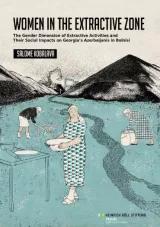Women in the Extractive Zone
Defined broadly, extractivism is an appropriation of natural resources for economic accumulation at a scale that exceeds the regenerative capacities of natural systems and generates adverse environmental and social outcomes (Acosta, 2013; Gudynas, 2013). Even though industrialized mining of raw materials counts over a century-long history in Georgia and has seen a number of sector-related social protests in recent decades (Qeburia & Chubabria, 2017), local manifestations of extractivism are still a novel subject of study. While copper ores and concentrates – the products of mineral extraction – top the list of export materials of Georgia (GeoStat, 2022), more broadly, the mining sector’s input in the country’s overall economy and employment market remains negligible (Chivadze, 2020). Against this backdrop, in areas where natural resources are extracted intensively, local communities and ecosystems pay a disproportionately high social and ecological price (Aroshvili, 2020; Urchukhishvili, 2021; Tsintsadze, 2020).
The latest research on Georgia’s mono-industrial, mining cities of Chiatura, Zestafoni, and Kazreti, examines the impacts of extractivism at the intersection of labor, ecological, social, economic, and gender relations (EMC, 2020; Urchukhishvili, 2021). The studies that specifically focus on the gender dimension of extractivism look at the labor migration of women from mono-industrial urban settlements and the absence of opportunities for their economic participation due to the lack of employment alternatives beyond the low-paid, and occupationally hazardous mining industry (Aroshvili, 2020; Urchukhishvili, 2021). Yet, little is known about Georgia’s rural women who belong to ethnic minority groups, and who live in the extractive zones but are unable to leave or emigrate, having to make life possible under direct and pernicious effects of extractive activities instead.
Broadly speaking, rural women in Georgia experience multiple forms of discrimination and face numerous challenges, be it a lack of access to economic, healthcare, legal, social, and mental health services or a dearth of opportunities for civic and political participation.
This is compounded by gender inequity in the accessibility of financial and land resources in the agricultural sector (Golemac Powell et al., 2020) which places rural ethnic minority women in a particularly vulnerable position, as they get excluded from support programs for women in agriculture, often because of a persisting language barrier (Mamedli, 2022). The gender composition of the agricultural workforce in the country suggests asymmetries in the distribution of labor as well. With the exception of Georgia’s Racha-Lechkhumi and Kvemo Svaneti regions, the overall share of women employed in agriculture, especially informally, is greater compared to men. In this respect, ethnically diverse Kvemo Kartli leads the way where women engaged in agriculture (60% in 2019) outnumber men (Golemac Powell et al.,2020) and 42% of the local population is comprised of Georgia’s Azerbaijanis.
In view of the multiple inequalities that rural women of ethnic minorities face in Georgia, this study examines the experiences of women from the country’s largest ethnic group, Georgia’s Azerbaijanis (6% of the total population) (GeoStat, 2016) living in Kvemo Kartli and specifically, in Bolnisi municipality where commercial extraction of natural resources abound. Considering the centrality of agriculture in Bolnisi’s local economy (Darsavelidze et., al., 2018), and the input of Georgia’s Azerbaijani community in its continuity, it is clear that the municipality as a whole, and Georgia’s Azerbaijani community in particular, depend greatly on the accessibility of natural resources, and environmental conditions, all of which are threatened by unbridled extractive activities in Bolnisi.
Given the above, this study analyzes extractivism in light of multiple forms of extraction operations that take place in Bolnisi and while doing so, it adopts the broader definition of the concept (Acosta, 2017). Theoretically, the study draws on feminist political ecology in an effort to understand how extractive activities affect women in Bolnisi’s Azerbaijani community, uncovering connections between their labor, and daily experiences, access to natural resources, and changes in the natural environment.
Product details
Table of contents
1.1. Theoretical Framework: Feminist Political Ecology 7
1.2. Extractivism 7
1.3. Critique of Extractivism from a Gendered Perspective 8
1.4. Data Collection and Analysis 9
2. Agriculture in Bolnisi and Georgia’s Azerbaijani Community 12
2.1. Women of Georgia’s Azerbaijani Community 13
3. Extraction of Natural Resources in Bolnisi 14
3.1. Mining of Gold and Non-Ferrous Metals 15
3.1.1. River Pollution by Gold and Non-ferrous Metal Mining and its
Ecological Impacts on Rural Settlements of Georgia’s Azerbaijanis in Bolnisi 15
3.1.2. The Impacts of Gold and Non-ferrous Metals Mining on the Women of
Georgia’s Azerbaijani Community in Bolnisi 17
3.2. Irrigation Water 18
3.2.1. Extractive Character of Uneven Distribution of Irrigation Water in Georgia’s
Azerbaijani Community in Bolnisi 18
3.2.2. Gender Dimension of Uneven Distribution of Irrigation Water in Georgia’s
Azerbaijani Community in Bolnisi 20
3.3. Sand and Gravel Extraction 21
3.3.1. Environmental, Social and Gender Impacts of Sand and Gravel Extraction
in Zemo and Kvemo Arkevani Villages 21
Recommendations 25
Bibliography 27

